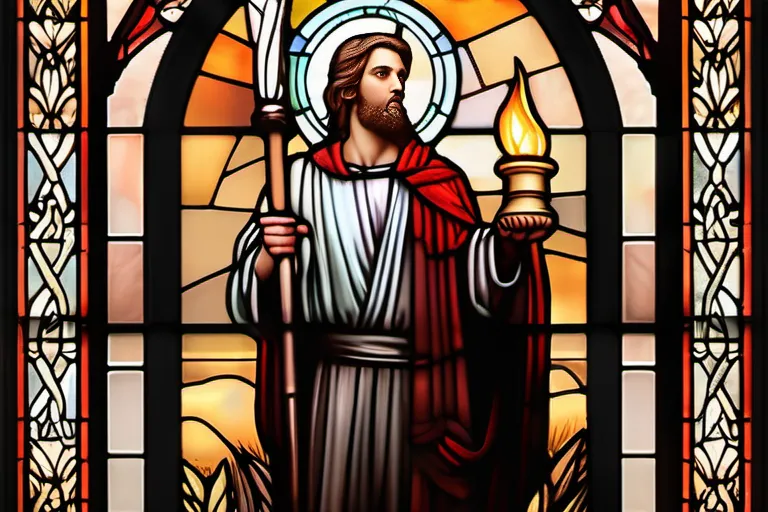Explore the history, definition, types, and significance of martyrdom in various religions.
Martyrdom is a concept deeply rooted in many religions, symbolizing ultimate devotion and sacrifice. In this article, we delve into the meaning, history, and types of martyrdom across different faiths.
The Historical Roots of Martyrdom
Imagine a world where heroes are born not from battles, but from sacrifices. Where the bravest are those who face their end with conviction and resolve. This is the story of martyrdom, a term that has echoed through time, resonating in every culture and religion.
Martyrdom finds its earliest roots in ancient civilizations. In Greek mythology, heroes like Achilles and Hector willingly laid down their lives for their communities. These early tales of sacrifice laid the groundwork for the concept we know today, but it was in religious contexts that martyrdom truly took shape.
In the Christianity of ancient Rome, followers faced persecution under Emperor Nero. They were often burned at the stake or fed to lions as a spectacle. These acts of sacrifice were seen not as defeat, but as victory over death itself. The term ‘martyr’ is derived from the Greek word meaning ‘witness,’ signifying that these individuals bore witness through their actions and suffered for their faith.
Moving eastward, we find similar narratives in Islam. Figures like Imam Hussain, who faced a tragic end at the Battle of Karbala, exemplify the ideals of martyrdom. Here too, sacrifice became synonymous with devotion and loyalty to one’s beliefs.
In Judaism, martyrdom is often associated with individuals willing to die rather than violate religious commandments. The Maccabees during the Second Temple period are a prime example, standing up against Greek oppression despite the dire consequences of resistance.
Hinduism, too, has stories of individuals who faced death for their beliefs or to uphold moral principles. While not always religious in nature, these acts often echo the spirit of martyrdom found in other faiths.
Through these varied historical lenses, we see that martyrdom is a multifaceted concept, shaped by cultural and religious contexts. Each tradition has its own criteria for what constitutes a true martyr, but at its core, it remains an act of profound sacrifice and commitment to one’s beliefs.
Defining Martyrdom: A Cross-Religious Perspective
How do you define martyrdom? Is it simply dying for one’s beliefs, or does it carry deeper meanings across different religions? In our quest to understand martyrdom, we must delve into its complex definitions and explore how these vary—yet often overlap—in major world religions.
In Christianity, a martyr is someone who suffers persecution and dies for their faith. This idea has roots in the early church but gained prominence with figures like St. Stephen, the first Christian martyr. But what about other religions? How do they view martyrdom?
In Islam, shahid (witness) denotes someone who sacrifices their life for a religious cause or in defense of religion. The Prophet Muhammad himself is often cited as an example of a martyr, emphasizing the idea that one can be a witness even if they do not die for their beliefs.
Judaism also acknowledges the concept of keneged, where individuals sacrifice themselves to uphold religious or moral laws. However, this is more of a historical and literary concept rather than an everyday occurrence, unlike in some other faiths.
In Hinduism, martyrdom is less about physical death for one’s beliefs and more about the ultimate sacrifice made by deities and sages, often through mythical narratives. The idea is not as prominent in practice but exists in spiritual lore.
Comparing these definitions, we see that while each religion has its unique take on what constitutes a martyr, there are underlying themes of sacrifice and dedication to one’s faith or cause. These shared elements suggest that the concept transcends religious boundaries, yet it is shaped by the specific cultural and historical contexts of each tradition.
As we explore these definitions, it becomes clear that martyrdom is not just about dying for one’s beliefs; it’s also about embodying them in life. The journey from understanding to defining martyrdom across religions is a fascinating exploration into the human spirit and its unwavering commitment to faith.
Types of Martyrdom: From Passive to Active
Moving from the definitional aspects to the practical manifestations, one might wonder: What exactly does it mean for someone to be a martyr in various religions? We often think of martyrdom as a noble sacrifice, but the nuances can get quite complex. Let’s dive into two major types: passive and active martyrdom, both of which hold significant meanings across different religious traditions.
Passive martyrdom, much like an unassuming seed lying dormant in the soil, quietly awaits its time to sprout. In many religions, this form of martyrdom involves a silent suffering or enduring hardship without protest. It’s as if the individual is biding their time, waiting for the moment when their unwavering faith will bear fruit. This type can be seen in various historical figures who remained steadfast even under persecution, their stories often becoming legends that inspire future generations.
On the other hand, active martyrdom is more like a spark igniting a fire. It involves overt actions of protest or resistance, often resulting in self-sacrifice for one’s beliefs. This form can be highly visible and immediately impactful, leading to significant social or political changes. Think of it as the difference between planting seeds that might not sprout for years versus lighting a torch that ignites immediate change.
The significance of these two forms varies widely across religions. In Christianity, passive martyrdom often highlights personal sacrifice and inner faith, while active martyrdom emphasizes public witness and advocacy. Conversely, in Islam, both types can be seen as equally valorous; the quiet endurance of hardship is highly respected, alongside those who openly resist oppression.
Understanding these nuances helps us see that martyrdom isn’t just about dying for one’s beliefs but also about how one lives while holding onto those beliefs. Whether it’s through silent suffering or bold action, both forms highlight the profound impact of personal faith on society. It’s a reminder that our choices and actions can ripple far beyond what we might imagine.
Martyrdom in Christianity: Saints and Martyrs
In Christianity, martyrdom has been a powerful force, often serving as a beacon of faith and courage through turbulent times. Imagine standing firm in your beliefs when faced with the ultimate test: would you be willing to lay down your life for them? This is exactly what martyrs do, making their sacrifice all the more poignant. Think about the early days of Christianity, where Christians were persecuted by Roman authorities. Martyrdom wasn’t just a choice; it was a stark reality that many faced.
One of the most notable figures in Christian martyrdom is Saint Stephen. According to tradition, he became the first Christian martyr when he was stoned to death for his beliefs. His story serves as a reminder of the cost of following one’s faith. Can you imagine being so strongly convinced of your cause that you would face such a gruesome end? This kind of unwavering commitment has inspired countless Christians throughout history.
The role of martyrs in Christian history extends beyond their own suffering; they often act as living examples to inspire others. Saint Lawrence, for instance, endured the most excruciating torture but maintained his faith until his last breath. His steadfastness and courage have made him a saint and an icon of Christian martyrdom. How does such resilience impact your view of what it means to be a faithful follower?
Martyrdom in Christianity is not limited to the early church; it continues to resonate today, with figures like Martin Luther King Jr., who embodied the spirit of Christ’s teachings through his nonviolent activism and ultimate sacrifice. His life and death remind us that martyrdom can take many forms, from the physical to the spiritual. What does this say about the enduring relevance of Christian martyrs in our modern world?
Martyrdom in Islam: The Shuhada’ and Shahids
Martyrdom in Islam: The Shuhada’ and Shahids
When we talk about martyrdom, one name often comes to mind in the context of Islam: shahid. This term, which translates to ‘witness’ in Arabic, holds a profound significance. But what exactly does it mean for someone to be called a shuhada’ (plural form)? Is it merely dying for a cause, or is there more to the concept than meets the eye?
In Islamic tradition, being a shahid goes beyond physical death; it encompasses a spiritual transformation and a deep commitment to faith. The journey towards becoming a shuhada’ begins with a profound acceptance of one’s beliefs, a willingness to embrace sacrifice, and a readiness to face challenges with unwavering dedication.
The term ‘shahid’ is not just about dying for Islam; it’s also about living a life that reflects the values of the faith. These individuals are seen as living witnesses, embodying the principles of justice, compassion, and righteousness in their everyday actions. Their stories serve as beacons of inspiration, reminding Muslims around the world of the importance of upholding these values.
Consider the tales of early Muslim martyrs who fought for the sake of spreading Tawhid, or the unity of God. These individuals willingly sacrificed themselves to preserve and promote their beliefs, becoming a testament to the power of faith in the face of adversity. Their sacrifice is celebrated not just as an end, but as a means to strengthen one’s own resolve and commitment.
Today, the concept of shuhada’ continues to resonate, with modern-day figures who embody these principles through their actions. Whether it’s standing up against injustice or facing perilous situations for the sake of their beliefs, these contemporary shahids offer a compelling narrative that challenges and inspires.
In essence, martyrdom in Islam is about more than just death; it’s about living a life that leaves an indelible mark on the world. The stories of those who have been called shuhada’ serve as powerful reminders of the enduring impact one can make through faith and sacrifice.
So, when we think of martyrdom in Islam, let us remember not just their final moments but also the lives they lived – full of purpose, courage, and unwavering devotion to their convictions. These shuhada’ are more than just names; they are living examples of what it means to be a true witness in this world.
The Modern-Day Martyr: Contemporary Examples
The modern-day martyr: A contemporary example, do you know who they are? They walk among us, perhaps unnoticed until their sacrifice is made. Think about it; have you ever wondered what drives a person to give up everything for their beliefs?
Take the case of Maria Ishtiyaq, an advocate and human rights activist from Pakistan. She was assassinated in 2014 because of her work against blasphemy laws, which many believe are used as tools for persecution. Her story is a stark reminder of how dangerous these beliefs can be when enforced by individuals who feel they have the right to impose their views on others.
Or consider Juanita Velasquez, an American woman who was murdered in 2013 after her family refused to change their religious beliefs and she was killed for rejecting those beliefs. Her sacrifice highlights how deeply personal beliefs can become intertwined with one’s identity, making compromise almost impossible.
These examples are not isolated incidents; they are part of a broader trend where individuals choose martyrdom over assimilation or abandonment of core values. They embody the idea that some people are willing to die for their convictions, and this can be both inspiring and terrifying.
Martyrdom in our time is a complex phenomenon, intertwined with political, social, and religious factors. These modern martyrs often become symbols of resistance against oppression or injustice, much like historical figures who fought for freedom and justice. Their sacrifices echo through the ages, reminding us that sometimes, change comes not from compromise but from an unyielding commitment to one’s beliefs.
Conclusion
 By understanding the complexities and nuances of martyrdom, we gain a deeper appreciation for the sacrifices made by those who have given their lives in the name of their beliefs.
By understanding the complexities and nuances of martyrdom, we gain a deeper appreciation for the sacrifices made by those who have given their lives in the name of their beliefs.











